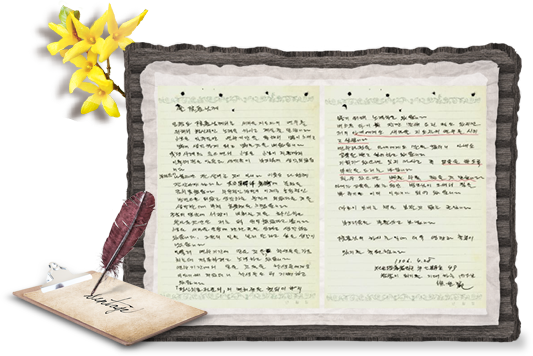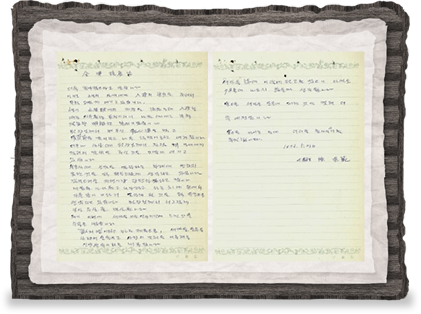Magazines
Read important articles published in Wolgan Saemaul.
Magazines

Comments by Professor Seo Jeong-Beom upon Completing Saemaul Training
I have come to feel ashamed for my past work and thoughts my past work and thoughts.
Sparrows are sitting in a row on a wire.
A hunter fired his gun and only the sparrow sitting at the end was shot dead.
A hunter fired his gun and only the sparrow sitting at the end was shot dead.
Why? “For sticking its head out to see who was shot”
This is one of the “sparrow jokes” that were popular among university students in the 1980s
There is a man who compiled these jokes and other stories popular in those days into a “Byeolgok (traditional form of Korean poem) Series.” That man was the late Seo Jeong-Beom (1926~2009), professor of Korean linguistics. He was a Korean linguist who had studied the Korean as well as the Altai language and was known for his pioneering research on the use of traditional Korean language by Korean shamans, but he was also deeply interested in the forms of contemporary language at the time. In this sense, the “Byeolgok Series” was not simply a compilation of jokes but a source reflecting how language was used at the time the book was published.

In the spring of 1976, Professor Seo received training at the Saemaul Leaders Training Institute for a week. Upon completing the program, he wrote a letter to Kim Jun, Director of the Institute, to convey his gratitude.
Letter from Professor Seo to Director Kim
(April 28, 1976)
(April 28, 1976)

“ Throughout the training period,I have become humble upon realizing that farmers are better people than we are in the sense that they have mastered the art of self-help,
hard work and cooperation by doing,
whereas people in my profession tend to put words over action.
I hope my wife could also receive Saemaul leader training
the sooner the better
In 1973, the Saemaul Training Institute, former Exemplary Farm Training Institute [독농가연수원을 계승한], broadened the scope of its trainees from leaders of farming and fishing villages to public officials, entrepreneurs, students and religious and social leaders, according to government policies to expand Saemaul Undong to a well-living campaign on a nationwide scale. This was also the background against which Professor Seo came to receive Saemaul training. The training programs were offered to all trainees equally without any discrimination of their social status. Roughly 300 trainees from various occupational and social backgrounds followed a one-week training program which was customized according to trainee groups. In the case of social leaders, for instance, programs were focused more on “session discussions” which were discussions based on best practice cases, rather than professional education.
Session discussions provided an opportunity for participants to set their own tasks and goals, and independently explore ways to achieve them, through which they can look back on themselves and contemplate on the future of their society and country. Deeply moved by the discussions, Professor Seo confessed to wife of his realization that “farmers were better people than we are,” suggesting that she also receive Saemaul training. In his letter, he describes his role as an intellectual as the following:
Session discussions provided an opportunity for participants to set their own tasks and goals, and independently explore ways to achieve them, through which they can look back on themselves and contemplate on the future of their society and country. Deeply moved by the discussions, Professor Seo confessed to wife of his realization that “farmers were better people than we are,” suggesting that she also receive Saemaul training. In his letter, he describes his role as an intellectual as the following:
“ I am considering writing about Saemaul Undong.
I want as many people as possible to know what these people are doing.
I am also trying to apply what
I have learned through the training to my teaching. ”
I want as many people as possible to know what these people are doing.
I am also trying to apply what
I have learned through the training to my teaching. ”
She looked sullen going into training
but looked full of life coming out of it.”
Among some social leaders, there were some who felt resistant to undergoing training at the Training Center. It was not only due to their perception that they had nothing to do with Saemaul Undong but also because they felt uncomfortable about training with others as a group in a camp.

However,
after coming to realize the foundational essence of the Saemaul spirit of hard work, self-help and cooperation by learning through practical case studies rather than theories, they became avid supporters of Saemaul Undong as “hardwood charcoal made in a furnace.
Professor Seo wrote another letter to Director Kim to convey his feelings he had when he went to greet his wife coming out of training. He wrote that his wife had looked sullen going into training but came out looking full of life and high-spirited. He also shared conversations he had had with his fellow colleagues at Kyunghee University, which was that they were reluctant when first walking into the Training Center but were now discussing measures to make the movement more effective.
Just as you spend the most time preparing for a meal for your loved ones, we consider our visitors our loved ones and offer them carefully-prepared meals
Professor Seo published an essay titled “A Meal for Loved Ones” based on his experience during the Saemaul leaders training program. The story begins with the “porridge” he had in the training center cafeteria. Having had a weak stomach, he was given porridge instead of rice unlike 300 other trainees there. Soon he came to find out how this special treatment of kindness was possible. The cafeteria staff at their session discussions had decided to “provide a heartfelt meal to each and every trainee by considering them as one of our loved ones”.











